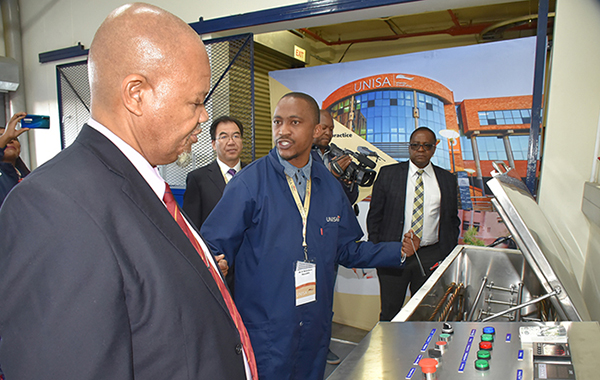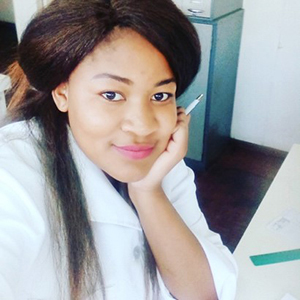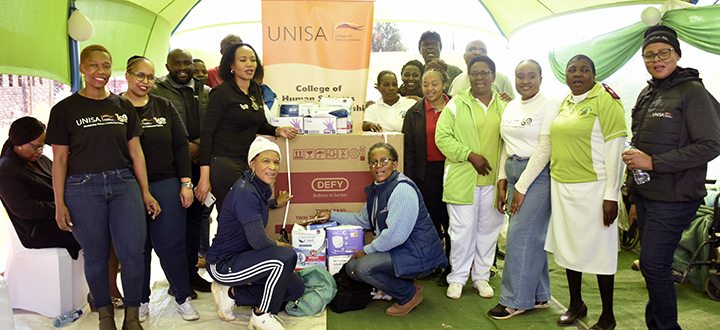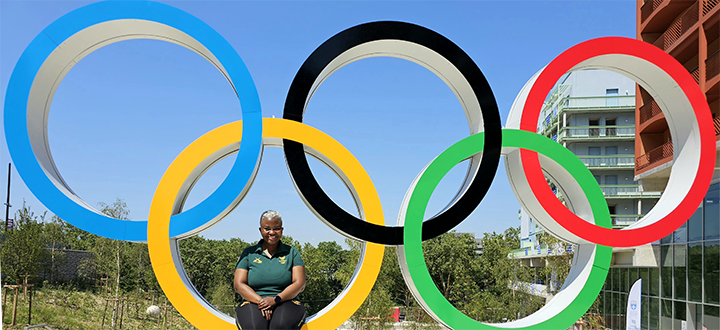College of Science, Engineering & Technology
Heeding the President's call to action, Unisa's labs step up to the sanitiser challenge
The humble hand sanitiser was one of the first products to disappear from South Africa’s retail shelves as the extent of the Covid-19 crisis became increasingly clear, yet it remains one of the most essential and basic weapons in the battle to contain the virus. Responding to President Cyril Ramaphosa’s call for South Africans to come together like never before to face a threat unlike any other experienced in recent memory, the University of South Africa (Unisa) is utilising the laboratories and equipment at its high-tech Science Campus to provide citizens with an effective, affordable hand and surface sanitiser solution.

Prof Mandla Makhanya, Unisa Principal and Vice-Chancellor, and a Chinese delegation during a 2019 visit to the NanoWS labs
The project is the brainchild of MSc student Fungai Chibaya and draws on the expertise of scientists attached to the university’s Nanotechnology and Water Sustainability (NanoWS) research unit. Located in Unisa’s College of Science, Engineering and Technology (CSET), NanoWS is a strategic research unit that sustainably addresses current and emerging issues relating to water quality and water scarcity. Established in 2014, the unit has a proud history of providing technology solutions to communities all over the country.

MSc student, Fungai Chibaya
"Well in advance of the current lockdown, I noticed media reports on shortages of hand and surface sanitisers," says Chibaya, "and within weeks these products were nowhere to be found in retail establishments and pharmacies. Realising that my scientific training enabled me to, at least within my immediate environment and on a small scale, provide an alternative to commercial brands, I produced a batch of sanitisers at my apartment on 11 March 2020. The batch passed testing with flying colours."
Samples in hand (no pun intended), Chibaya approached Unisa with the idea of producing the sanitiser on a larger scale. Prof Thabo Nkambule, Acting Director of NanoWS, and Prof Bhekie Mamba, Executive Dean of CSET, immediately bought into the idea and proposed production at the NanoWS laboratories. Unisa’s procurement division came on board to procure the necessary raw materials.
Assisted by NanoWS instrument scientist Hlengilizwe Nyoni, Chibaya is currently hard at work producing the product in volume at the labs. Official registration and branding have been prioritised, and initial distribution has commenced among Unisa staffers. In addition to the all-important hand sanitation, the solution is also used at the university to sanitise laboratory spaces and working surfaces in offices.
The immediate plan is to scale up production within the confines of operation during the countrywide lockdown period (permits to provide an essential service have already been granted), and to supply Unisa in full for its own operations. It is anticipated that even after the lockdown has been lifted, the practice of clean hygiene will be imperative and in the longer run the university intends extending production and supply to government, hospitals and pharmacies.
"We currently have the capacity to produce 1 000 litres in a day, when produced in bulk," says Nkambule. "To partially recoup material and labour expenses, we would ideally wish to sell 50% of the sanitisers produced to recover costs, and donate the other half to Unisa students and staff, and the communities we serve."
* By Philip van der Merwe, Unisa Department of Institutional Advancement
Publish date: 2020-04-02 00:00:00.0

 Unisans commemorate Mandela Day with the elderly
Unisans commemorate Mandela Day with the elderly
 Unisan appointed psychologist for Team South Africa at the Paris 2024 Olympics
Unisan appointed psychologist for Team South Africa at the Paris 2024 Olympics
 Unisa honours Dr OK Matsepe's enduring legacy
Unisa honours Dr OK Matsepe's enduring legacy
 Great strides towards concretising Unisa-PMC partnership
Great strides towards concretising Unisa-PMC partnership
 Mental health among men in the workplace needs more attention
Mental health among men in the workplace needs more attention